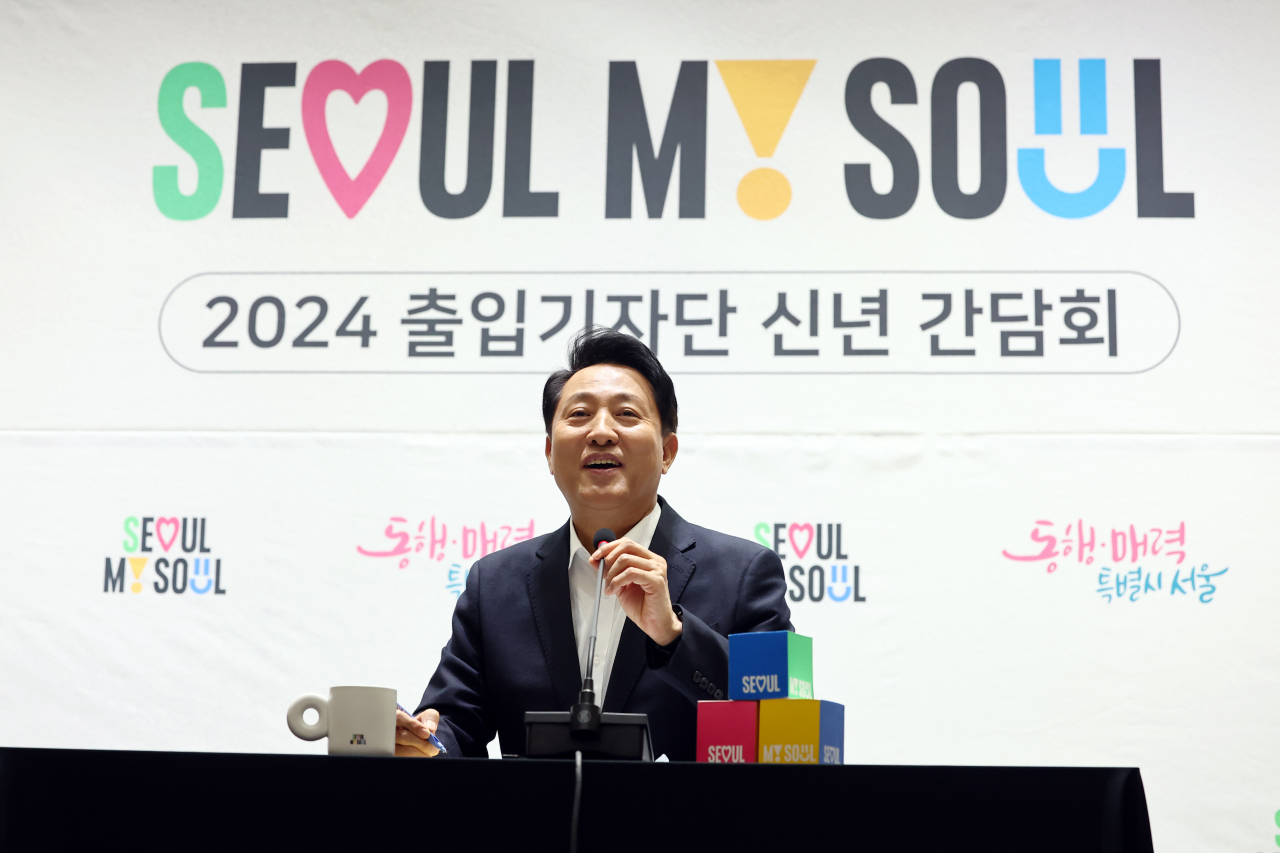 |
Seoul Mayor Oh Se-hoon speaks at a New Year's press conference at Seoul City Hall on Wednesday. (Yonhap) |
From the launch of a new service that enables unlimited subway and bus access in Seoul to a water bus that transports passengers from Yeouido to Gangseo-gu in 30 minutes, 2024 is to be marked by a series of major transformations in the capital's public transportation services, Seoul's mayor said Wednesday.
At a New Year's press conference, Seoul Mayor Oh Se-hoon said the "climate card," set to launch on Jan. 27, was the result of a new policy adopted to both mitigate pollution from fossil fuel-powered passenger cars and to expand welfare benefits to vulnerable groups in the city.
Seoul is set to introduce the unlimited public transportation pass on Jan. 27. The pass will provide access to all bus routes and subway lines in Seoul for a monthly fee of 62,000 won ($47). Access to the city's public bicycle-sharing service, Ttareungyi, can be added for an extra 3,000 won.
“From September, the Hangang River Bus allowing commuters to travel from Gangseo-gu to Yeouido in just 30 minutes by boat should also be available,” Oh said.
On the ruling People Power Party's "megacity" scheme that would incorporate cities near Seoul into the capital, the mayor, who belongs to the ruling party, said discussions should take place after the general election in April, stressing that it should not be interpreted as a scheme designed to attract votes.
Rather, this "megacity" scheme should be understood as a part of efforts to merge the residential and administrative roles of the city, according to Oh.
“Throughout the city’s history, the city absorbed the suburbs of Seoul. For example, Seoul’s administrative districts absorbed the south and northeastern areas, to merge living and administrative areas by 1963,” Oh said.
For further development on the scheme, the Seoul Metropolitan Government is currently in talks with Gimpo City and Guri City for potential partnerships, Oh added.
Oh said other plans to promote climate action are also in the works, such as building more green spaces, restoring historic sites and helping innovative companies grow, aimed at making the capital both more liveable and more attractive.
The city is considering a two-phase restoration project of Donuimun, one of the Four Great Gates of Seoul. For the first phase, Donuimun Museum Village near the Jeongdong Intersection would be demolished and turned into a park with green spaces by 2026. A part of Saemunan-ro would be placed underground by 2035 for the second phase and Donuimun would be restored on top of it.
“As Dongdaemun and its nearby area have been successfully restored as a historical park with green spaces, hopefully the Donuimun area will be restored in that way,” Oh said. This kind of restoration project is part of the city’s efforts to make the capital more liveable and attractive to tourists.
Meanwhile, Oh also mentioned the need for nuclear armament in South Korea.
When questioned on the topic, the mayor strongly emphasized the need for nuclear armament in the context of continued North Korean provocations. Oh stressed that it would help enhance Seoul's negotiating power.
"It is important to enhance nuclear potential, and in that sense, I believe now is an appropriate time, considering the progressive nature of North Korea's security threat," he said.







![[Today’s K-pop] Blackpink’s Jennie, Lisa invited to Coachella as solo acts](http://res.heraldm.com/phpwas/restmb_idxmake.php?idx=644&simg=/content/image/2024/11/21/20241121050099_0.jpg)